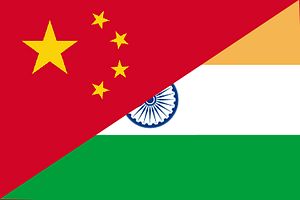China-India relations are mover quicker than they have in a while on the strategic level. Most of the initiative over this summer has come from the Chinese side, which wasted little time following Narendra Modi’s historic electoral victory in attempting to woo India with a foreign policy “reset” of sorts. Xi Jinping sent Foreign Minister Wang Yi as his envoy to New Delhi in an attempt to shift the nexus of the India-China bilateral relationship from cooperation between rivals to that of cooperation between friends with mutual interests.
Recently, Wang met Indian External Affairs Minister Sushma Swaraj in Napyidaw, on the sidelines of the ASEAN Regional Forum’s Foreign Ministers’ meeting. He emphasized the potential for India and China to build their relations on the basis of cooperation: “China and India, the two biggest developing countries who are neighbors, if join hands in cooperation, will make the world more balanced, secure and stable.” The meeting came on the heels of China inviting India to join Xi Jinping’s vision for a new “Silk Road,” both land-based and maritime, in Asia–again demonstrating Chinese initiative in the bilateral. With all the rhetoric coming out of Beijing of late, India seems to be an inextricable part of Xi’s initiative to economically integrate Western and Southern Asia with China.
The real litmus test for India-China relations in Xi Jinping and Narendra Modi era will come in the form of Xi Jinping’s visit to India next month. Xi is expected to visit New Delhi in the third week of September, according to The Economic Times. If one were to predict the agenda of that trip based on trends in Chinese foreign policy towards India since June, it would be likely that Xi will focus on economics and possibly initiate negotiations towards a permanent resolution to the disputed border between the two countries. India and China have a long-standing border dispute and fought a war in 1962. The disputes are over Aksai Chin in Kashmir and Arunachal Pradesh (known as South Tibet in China) in the East. China administers the former and India administers the latter.
Xi’s visit to New Delhi will be flanked by a couple important trips abroad by Narendra Modi himself. Modi is slated to visit both Washington and Tokyo. His government will be keen to expand India’s strategic partnership with Japan which, under Shinzo Abe, is increasingly more flexible and willing when it comes to security cooperation. Abe’s government recently passed a resolution that modifies Japan’s post-war constitutional restriction on collective self-defense. India and Japan are also expected to conclude a deal for the sale of Japanese maritime surveillance aircraft to India during that visit.
Despite Beijing’s initiative and interest, New Delhi remains largely suspicious of Chinese intentions. For the moment, New Delhi will have to make a decision on whether it wants to accept Xi Jinping’s proposal to join the new “Silk Road” initiative. In theory, economic connectivity should benefit everyone, including India, but New Delhi is wary of strategic encirclement by China. It doesn’t help that over the past decade China has expanded its development cooperation with Pakistan, Sri Lanka, Nepal, Bhutan, and Myanmar, deepening Indian anxieties.
Fortunately, with a small stroke of inspiration, Narendra Modi’s government could very well hit Beijing with a resounding “yes.” Not only would it demonstrate his government’s pragmatism on matters of foreign policy, but it would also open the door for a more matured bilateral with Beijing–one that leaves the specters of 1962 far behind. Modi has repeatedly said that his first priority will be to get India’s internal house in order before worrying about India’s standing on the world stage. Accepting China’s overtures does not necessarily mean abandoning all prudence; in fact, if New Delhi plays its cards right, it could deepen economic cooperation while negotiating a final border agreement with China. As Ajai Shukla notes, it is imperative that India move beyond merely “managing” its border dispute with Beijing and actually resolve it.
The scope for cooperation between India and China is higher now than it has been in some time. For now, Beijing has effectively left the ball in India’s court. Over the next month, New Delhi will likely be weighing the costs and benefits of taking China’s invitations at face value. Nevertheless, the potential transformative effect of this immensely important Asian bilateral relationship taking off in the coming years should not be underestimated.

































